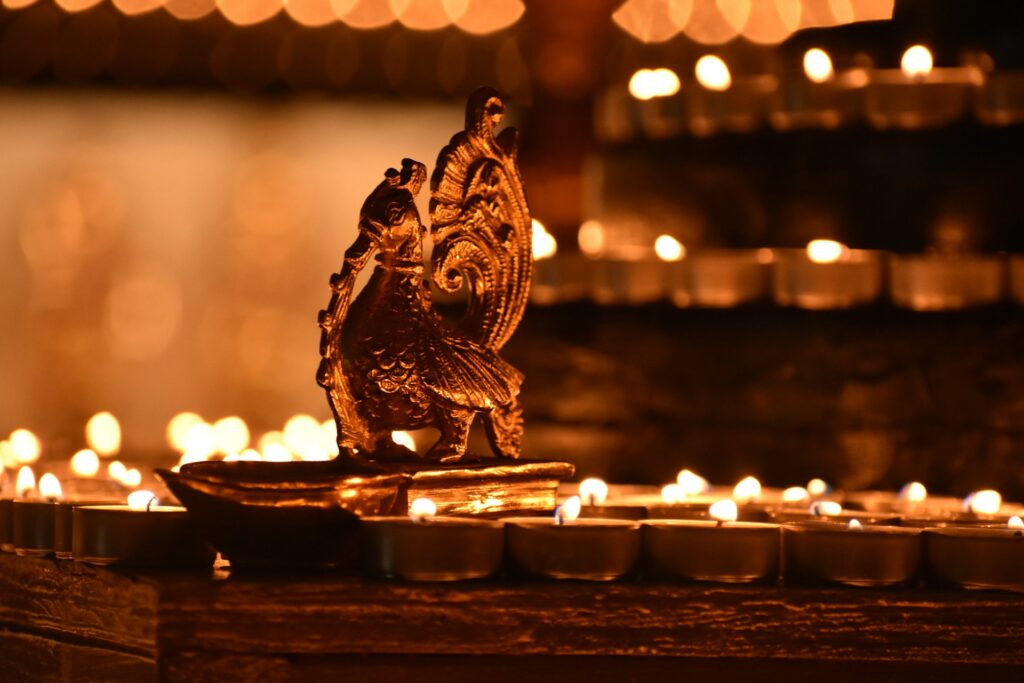Diwali, the most significant and joyous festival of India, illuminates the nation with its dazzling lights, vibrant colors, and festive spirit. This festival of lights symbolizes the victory of light over darkness, good over evil, and knowledge over ignorance.
The Significance of Diwali:
Diwali commemorates the return of Lord Rama, along with Sita and Lakshmana, to Ayodhya after defeating the demon king Ravana. The festival is also associated with the birth of Goddess Lakshmi, the goddess of wealth and prosperity. People decorate their homes with colorful lights, diyas (clay lamps), and rangolis (colorful floor designs) to welcome Goddess Lakshmi and Lord Ganesha.

Diwali Celebrations:
Diwali celebrations typically span over five days, each with its own significance:
Dhanteras: The Glittering Start to Diwali:
Dhanteras, the auspicious day that marks the beginning of the five-day Diwali festival, is celebrated with great fervor and devotion across India. This day holds immense significance, particularly for those who believe in the power of wealth and prosperity.
Why is Dhanteras Special?
Worship of Dhanvantari: Dhanteras is named after Dhanvantari, the divine physician who emerged from the churning of the cosmic ocean, holding a pot of Amrita (nectar of immortality). People worship him to seek blessings for good health and longevity.
Goddess Lakshmi’s Arrival: It is believed that Goddess Lakshmi, the goddess of wealth and prosperity, visits homes on Dhanteras. To welcome her, people clean their homes, decorate them with diyas, and perform Lakshmi Puja.
Auspicious Shopping: Dhanteras is considered an auspicious day to make significant purchases, especially gold, silver, and other precious metals. It is believed that buying these items on this day brings good luck and prosperity.
How to Celebrate Dhanteras:
Cleanse Your Home: Clean your home thoroughly to remove negativity and make way for positive energy.
Decorate with Diyas: Illuminate your home with diyas, candles, and fairy lights to create a festive ambiance.
Perform Lakshmi Puja: Offer prayers to Goddess Lakshmi and Lord Ganesha to seek their blessings.
Make Charitable Donations: Donate to charity to accumulate positive karma.
Purchase Gold or Silver: Buy gold or silver jewelry or coins to invite wealth and prosperity.
By following these traditions and rituals, you can make the most of Dhanteras and set a positive tone for the entire Diwali festival.
Choti Diwali:
People worship Lord Yama, the god of death, to seek blessings for a long and healthy life.
Diwali: The main day of the festival.
A Night of Wonder
On this auspicious night, people adorn their homes with colorful lights, intricate rangolis, and sparkling diyas. The air is filled with the aroma of delicious sweets and savory snacks. Families and friends gather to exchange greetings, share joyous moments, and participate in various rituals.
The Spiritual Significance
Diwali holds deep spiritual significance. It commemorates the return of Lord Rama to Ayodhya after defeating the demon king Ravana. The festival is also associated with the birth of Goddess Lakshmi, the goddess of wealth and prosperity. People offer prayers to these deities, seeking blessings for a prosperous and happy life.
The Festive Spirit
Diwali is a time for joy, gratitude, and the celebration of life. The festival fosters a sense of unity, harmony, and the spirit of giving. People exchange gifts, share meals, and participate in cultural activities, creating lasting memories.
Govardhan Puja:
People worship Lord Krishna, who lifted the Govardhan mountain to protect the people of Vrindavan from heavy rains.
Bhai Dooj:
This is festival where Sisters apply tilak to their brothers’ foreheads and pray for their well-being.
in return Brothers, give gifts to their sisters.
Diwali Delicacies
Diwali is incomplete without a variety of delicious sweets and savories. Some popular Diwali sweets include:
Ladoo: Sweet balls made from flour, sugar, and ghee.
Barfi: A dense, milk-based sweet.
Jalebi: Deep-fried, sweet dough dipped in sugar syrup.
Mysore Pak: A rich, buttery sweet made from gram flour and sugar.
Cultural Significance
Diwali holds immense cultural significance in India. It promotes unity, harmony, and the spirit of giving. The festival brings families and communities together, fostering strong bonds and creating lasting memories.
Diwali Records: A Festive Feat
Diwali, the Festival of Lights, is not only a celebration of faith and tradition but also a stage for record-breaking feats. Here are some of the most impressive Diwali records:
Guinness World Records
Largest Display of Diyas: Ayodhya, the birthplace of Lord Rama, has repeatedly set the world record for the largest display of diyas. In 2024, they lit up over 2.5 million diyas, creating a mesmerizing spectacle.
Most People Performing Aarti: Again, Ayodhya holds the record for the most people performing aarti simultaneously. In 2024, over 1,100 people came together to pay homage to Lord Rama.
Environmental Concerns
In recent years, there has been growing concern about the environmental impact of Diwali celebrations, particularly due to air pollution caused by firecrackers. Many people are now opting for eco-friendly Diwali celebrations by using noise-free and pollution-free crackers or avoiding them altogether.
Conclusion
Diwali is a festival that captures the hearts of millions of people around the world. It is a time for joy, gratitude, and the celebration of life. By embracing the cultural significance of Diwali and adopting eco-friendly practices, we can ensure that this beautiful festival continues to bring light and happiness to generations to come.